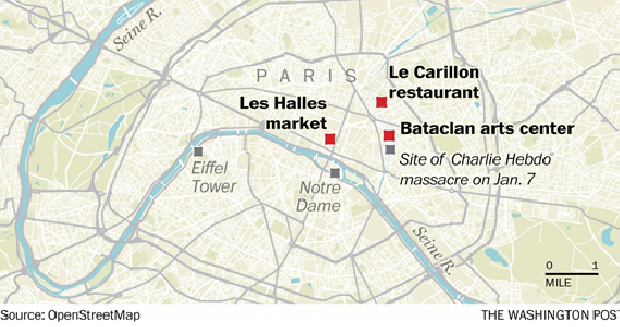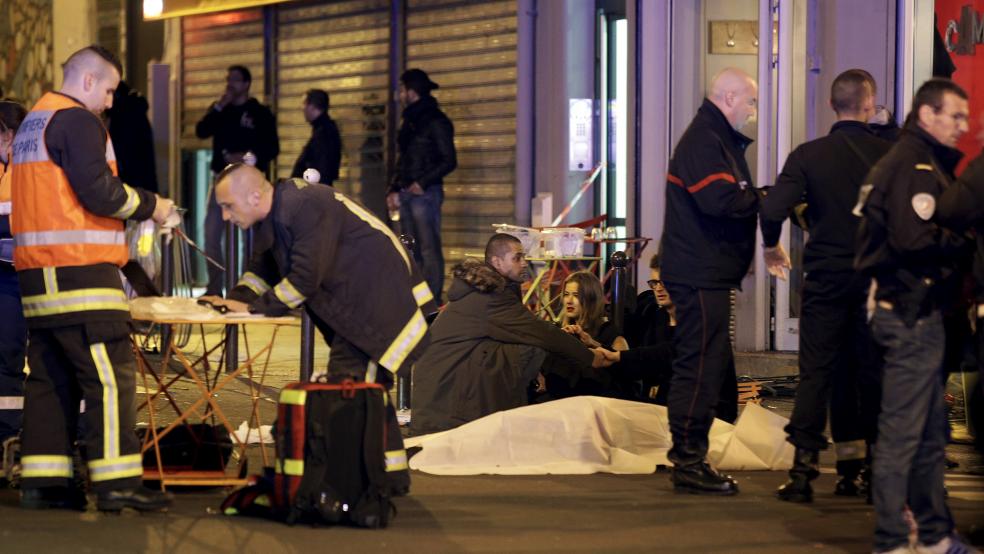PARIS — France declared a state of emergency and secured its borders Friday evening after attackers unleashed a coordinated wave of explosions, gunfire and hostage-taking in Paris that left well over 100 people dead and generated scenes of horror and carnage.
Taken together, the attacks represented one of the worst terrorist strikes on Western soil since Sept. 11, 2001. The attackers carried out suicide bombings, hurled grenades and shot dozens of hostages in an hours-long siege at a theater before police stormed the building. World leaders rushed to condemn the attacks. But they were quickly celebrated online by backers of the Islamic State and other extremist groups. There was no immediate claim of responsibility.
The killings traced an arc across the center of the city, targeting a packed concert hall, a soccer stadium and a restaurant — all lightly secured facilities where tourists and residents had, until the attacks, been enjoying Paris entertainment on a cool November evening. At least 129 people were killed, including one American exchange student from California.
The scene of the worst carnage was the Bataclan theater, where hundreds of people had gathered for a concert by an American rock band, Eagles of Death Metal. As the attacks reverberated elsewhere in the city, gunmen stormed the building. Witnesses said three or four men clad in black used assault rifles to mow down audience members at the concert hall, shooting some as they dove to the floor seeking safety.
President Obama expressed his condolences and offered his assistance to France after simultaneous attacks around Paris on Nov. 13. (Reuters)
“There are survivors inside,” a man named Benjamin Cazenoves posted on his Facebook account. He said he was in the hall before police closed in. “They are cutting down everyone. One by one.”
Police surrounded the building and, amid the sound of explosions and gunfire, moved in, shooting dead at least two attackers. As police secured the hall, they found evidence of a massacre inside, with at least 118 people dead, according to Paris’s deputy mayor, Patrick Klugman.
Government personnel guided survivors of the attack, wrapped in gold-colored heat blankets, down the street to waiting busses. Several had blood spattered on their clothing. Some cried. Others looked distressed. Most declined to talk to reporters.
One middle-aged woman with brown curly hair in a white sweater called out from the group of survivors to a man on the other side of the police barrier. He rushed over and embraced her. The pair simply stood, locked in each other’s arms, for several minutes.
Outside a cafe, witnesses reported seeing piles of bodies in the street, the cafe windows having been riddled with gunfire. At a soccer match, terrified fans gathered on the field, having been barred by authorities from leaving, after suicide bombers detonated explosives outside the stadium north of Paris. The explosions near the soccer stadium forced authorities to evacuate President François Hollande, who was among thousands watching a friendly match between France and Germany.
[Obama vows to bring those responsible to justice]
The president’s office said 1,500 French troops were deployed on the streets of Paris to back up police.

Across Paris, normal city life came to a halt. Subway lines were shut down, and authorities advised residents to stay indoors. People who were on the street in areas near the attacks fled in a panic.
“I was outside smoking a cigarette when I saw some people coming towards us saying an attack was going on at the Bataclan,” said Charlotte Baudoin, a 29-year-old event manager. “So everybody ran back inside the restaurant, and they locked the doors. We stayed inside for 50 minutes with the lights off. Then they told us to leave, but we did not feel safe on the streets.”
Well after midnight, several of the attackers were still believed to be at large.
The attacks were the worst in France in modern memory and brought fresh trauma to a country still reeling from three days of terror in January, when Islamist militants killed 12 people at the offices of the satirical publication Charlie Hebdo, left four hostages dead at a kosher supermarket and fatally shot a police officer. Al-Qaeda’s branch in Yemen later claimed responsibility for the attack on Charlie Hebdo, saying it was designed to strike back at the publication for its mocking treatment of Islam.
Hollande went on national television Friday night to announce a state of emergency, including restrictions at French borders and the deployment of the army.
“We know who these terrorists are,” he said, without elaborating. “These terrorists want to make us afraid and seize us with fear. . . . This is a nation that defends itself.”
While the new border controls were expected to be strict, international airlines and trains appeared to still be operating.
In Washington, a somber President Obama appeared in the White House briefing room to offer condolences and U.S. help “to bring these terrorists to justice.”
He said the wave of violence was not just an assault on France but “an attack on all of humanity and the universal values we share.”
“We are going to do whatever it takes to work with the French people and with nations around the world to bring these terrorists to justice and to go after any terrorist networks that go after our people,” Obama said. He pledged whatever help he could provide to the French government and praised it as an “extraordinary counterterrorism partner.”
Obama, who is scheduled to leave Saturday for the Group of 20 summit in Turkey, said he spoke prior to the attacks with Hollande and plans to talk with him again in the coming days.
“All of Paris needs our prayers tonight,” House Speaker Paul D. Ryan (R-Wis.) tweeted.
Within minutes of the first reports on the violence, Islamic State supporters created hashtags hailing “Paris in flames” and declaring that “ISIS is attacking Paris,” the Vocativ Web site reported.
Mary Lou Dorio, the mother of Julian Dorio, the drummer for the band Eagles of Death Metal, said in an interview that her son and other band members managed to escape the concert hall when the attack there began. However, the fate of several crew members remained unknown, she said.
“It was awful,” she said. She added that her son was at a local police station, where he was able to call his wife.
“It was a bloodbath,” Julien Pearce, a radio reporter in France, said in an interview with CNN. He said he was at the concert and saw three or four young men dressed in black open fire on the crowd with assault rifles, firing at random as people screamed.
“They didn’t shout anything. They didn’t say anything,” he said of the assailants. “They were just shooting [at] people.” He said he saw at least 20 bodies. “Some were dead. Others were very badly wounded,” he said. Roughly 1,000 people were attending the concert in the relatively small venue, he said.
Witte reported from London. Ryan Weber in Paris and Greg Jaffe, Adam Goldman and William Branigin in Washington contributed to this report, which appeared originally in The Washington Post.
Read more at The Post:



